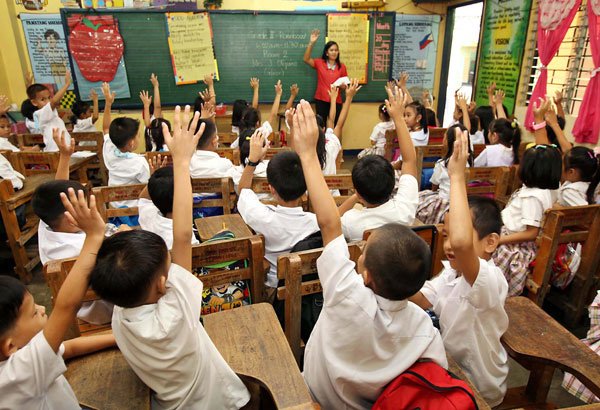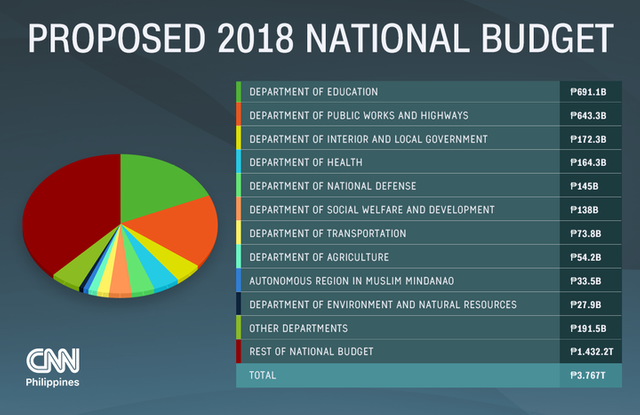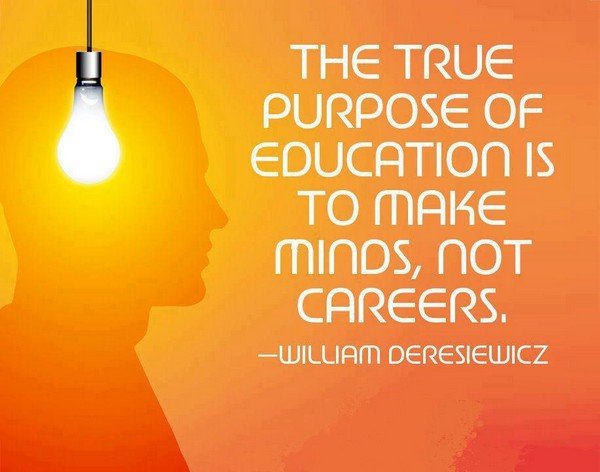Philippine Education System: A Catalyst for the Filipino Nation to Progress?

Image Source
Education is a tool for preparing towards being effective and productive when it comes to social relations. It is basically a social institution that shapes the minds and behavior of the people in a certain nation. The education system, in general, has two different structures which are the formal and the non-formal. Even if the two structures differ from their means, it also shares the main goal which is to educate people for the progress of a nation.
Formal Education
The formal education can be synonymous to “school”. It covers traditional school system which sets definite goals and objectives reached through systematized, formal instruction. It can be achieved in stages which usually range from Nursery, Kindergarten, Elementary, Junior and Senior High Schools, Undergraduate degrees to Doctorate. Upon entering into schools, it requires more admission procedures that need several documents and fees (tuition and other school fees, allowances, etc.).
Non-formal/Informal Education
Informal education is most likely the first type of education that one can attain, before entering in schools because this can be acquired by learning through interactions with others. Thus, it is true that our parents and family members are our first teachers. Opposite to formal education, this type is not covered by traditional school system.
It specifically teaches students a specific skill and requires less rigid admission procedures. In the early societies, informal education was widely used in order for a certain group of people to maintain and preserve their tribe, culture, beliefs and practices.

Image Source
The Brief Transition of Education from Informal to Formal
In early societies, mostly in the indigenous communities, family provides education assisted by elder members of the community in order to prepare the youth for adult roles that will enable them to cope with the various demands of the environment.
As the society shifts through time including the medium of communication, there has been a development of language to where the alphabet and the number system emerged that it caused death to the informal education and paved the way to formal education. The first schools were established in China, Egypt, Babylonia, India, Greece, and Rome.
In the mid-15th century, the first printing press was invented that resulted to mass production of early reading materials, which are forerunners of today’s textbooks. It was then followed by a massive establishment of formal education in the form of school systems.
Education in the Philippines
Based on the 1987 constitution of the Republic of the Philippines, Article XIV Section 1. “The State shall protect and promote the right of all citizens to quality education at all levels, and shall take appropriate steps to make such education accessible to all.” Thus, the education should be a right and not a privilege in the sense that the government should be responsible for creating means of providing it to the citizens as one of the basic social services for everyone to justly acquire.
It is also stated in the constitution via article XIV Section 5 that “The State shall assign the highest budgetary priority to education and ensure that teaching will attract and retain its rightful share of the best available talents through adequate remuneration and other means of job satisfaction and fulfillment.” This only means that the state should highly prioritize the education in the allocation of budget. Recently, the Department of Budget and Management released a report on the percentage changes of national budget allocation on education from 1955-2016.

Image Source
Year Percentage(%)
1955 30.78
1960 27.50
1970 24.40
1975 11.33
1980 9.91
1981 7.68
1984 10.50
1992 12.80
1998 17.81
2016 14.52
Based on the above information, the budget for education is fluctuating. It decreases throughout years that often results to the rising count of student dropouts because the kind of education system that the Philippines is already commercialized by the virtue of Education Act of 1982 which gives the schools an authority to increase tuitions and create other school fees to acquire more profit.
Meaning, education that is supposed to be a basic social service and is a right turned out to be a commodity and a privilege to whoever can afford. The institutions in higher education that are owned by the government (State Universities) supposed to provide accessible education is now owned by big businessmen or if not; they have at least, shares on it. Business men and corporations owning several universities and colleges is a clear manifestation of commercialization of education in the Philippines.
In order to maintain the wealth of the huge businessman in the country, they tend to suppress the students to question why the tuition rapidly rises and why our state cannot provide it free for when the constitution itself states it. They often repress those who initiate protest actions. In other words, they practice fascism in the academe.

Image Source
On the other hand, they are preventing the students to be inquisitive enough by feeding their (the students) mind a kind of education that is out of the concept of the Philippine context. The educational system that we have, in general is colonial for it follows the setting of foreign educational system. It does not directly studies about the Philippines and as to how can we improve our socio-economic condition when in fact it is clearly stated again in the constitution Article XIV Section 2.
The State shall (1) Establish, maintain, and support a complete, adequate, and integrated system of education relevant to the needs of the people and society; and Section 5. (2) They shall inculcate patriotism and nationalism, foster love of humanity, respect for human rights, appreciation of the role of national heroes in the historical development of the country, teach the rights and duties of citizenship, strengthen ethical and spiritual values, develop moral character and personal discipline, encourage critical and creative thinking, broaden scientific and technological knowledge, and promote vocational efficiency.
The current education system in the Philippines is thus problematic that even causes sluggish progress in the country. It clearly does not serve the interests of the Filipino people, but of the big businesses. There is a necessity for it to be remolded in such a way that it can be attained by anyone given that it is supposed to be a right and not a privilege, as stated in this state’s constitution. It should be mass-oriented -- free and accessible for all Filipinos.
Also, the education system should be scientific that allows students to study the Philippines from its geography, history, to its conditions and potentials to suffice the needs of the Filipinos so that they could innovate and think critically on how to advance the progress of the nation. Lastly, it should be nationalistic that benefits and serves the interest of the Filipino people; inculcate patriotism, love and respect to his fellowmen and the humankind.

Image Source
References:
http://www.officialgazette.gov.ph/constitutions/the-1987-constitution-of-the-republic-of-the-philippines/the-1987-constitution-of-the-republic-of-the-philippines-article-xiv/
Books:
Student Wordpress. 2011 Neo-liberal Policies on Education Booklet. 2011
Panopio, I. and Raymundo A. Sociology Focus on the Philippines, 4th edition. 2004
It's really beautiful post. Education is what remains after one has forgotten what one has learned in school.
Downvoting a post can decrease pending rewards and make it less visible. Common reasons:
Submit
education is the best legacy a parent can give his child
Downvoting a post can decrease pending rewards and make it less visible. Common reasons:
Submit
Education is important but I would prefer good moral personality than with great knowledge.
Downvoting a post can decrease pending rewards and make it less visible. Common reasons:
Submit
..it saddens me sir @juvyjabian,here in our City Grade 1-4 and Junior High students only spent half day in school.
Downvoting a post can decrease pending rewards and make it less visible. Common reasons:
Submit
In my country I need to go to school 18-20 years to be someone, but i have no certainty that I will get a good pay job after this years :(
Downvoting a post can decrease pending rewards and make it less visible. Common reasons:
Submit
As the sayings say, education should create minds not careers. If a person pursue education for the purpose of career, possibly he will become slave. Yes, day job is a form of slavery, modern slavery.
Downvoting a post can decrease pending rewards and make it less visible. Common reasons:
Submit
The educational system of our country definitely has a lot flaws and it should be taken into consideration. From the facilities down to the system itself.
Downvoting a post can decrease pending rewards and make it less visible. Common reasons:
Submit
Because nobody wanted to raise the issue with full authority and without political issues in the past.
Downvoting a post can decrease pending rewards and make it less visible. Common reasons:
Submit
I think a lot of people already raised this issue before and up until now but I guess its not part of the country's priorities.
Downvoting a post can decrease pending rewards and make it less visible. Common reasons:
Submit
This is a tricky one to answer. In one hand I would say that taxes would pay for every child's education. But that's not how the system works in the Philippines. High percentage of the population can't afford to go to school because you still have to pay for an education there.
There are a lot of families that live in rural areas of the Philippines where resources and access to basic needs are not up to par. These families have very little to no chance in having their child attend school and get an education.
It doesn't matter if it's a normal school day or not. There will always be kids walking around in the street with no foot ware and no police officers checking to see why they are not in school.
Downvoting a post can decrease pending rewards and make it less visible. Common reasons:
Submit
I believe these are among the issues that the current president of the republic is trying to address, hopefully.
Downvoting a post can decrease pending rewards and make it less visible. Common reasons:
Submit
Duterte is too busy with keeping his promise of making the fish in Manila bay fat from the dead drug dealers that he promised to exterminate. Then after committing crimes against humainty, he'll balance the books and send kids to school. Sounds like a clean wholesome guy.
Downvoting a post can decrease pending rewards and make it less visible. Common reasons:
Submit
Such a good article you have post. Education is one of KAYAMANAN that will not took to everyone. Nothing else.. zGodbless
Downvoting a post can decrease pending rewards and make it less visible. Common reasons:
Submit
Exactly!
Downvoting a post can decrease pending rewards and make it less visible. Common reasons:
Submit
I feel these childrens very inteligent
Downvoting a post can decrease pending rewards and make it less visible. Common reasons:
Submit